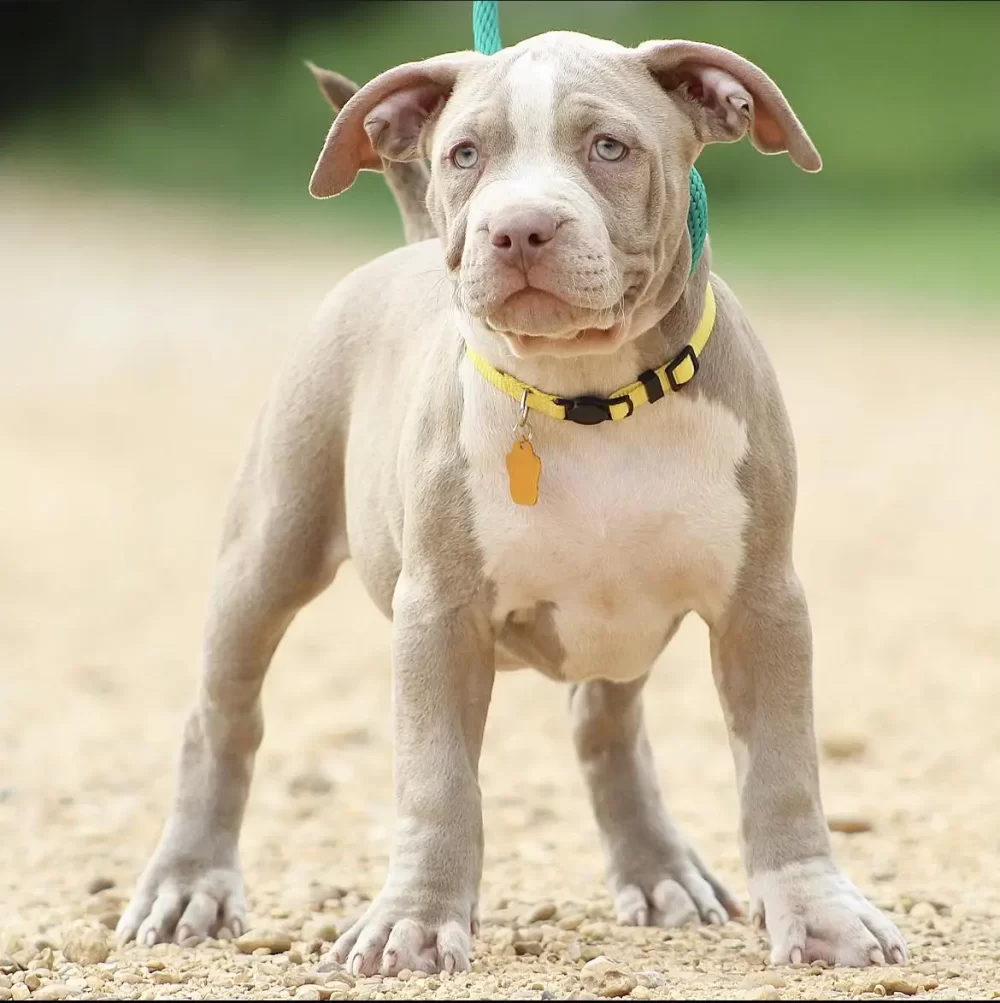Pitbull puppies are known for their energetic and playful nature, making them a popular choice for families looking for a new furry friend. However, like any other breed, American bully puppies require proper training and socialization to become well-behaved and well-adjusted dogs.
One common question among pitbull owners is when is the best time to introduce their puppies to the world. In this article, we’ll explore the ideal age to introduce pitbull puppies and the importance of early socialization and training.
The Importance of Early Socialization and Training
Socialization is the process of exposing a puppy to different people, animals, and environments in a positive and controlled manner. This is crucial for pitbull puppies as it helps them develop confidence, learn appropriate behavior, and become comfortable in various situations.
Pitbulls are often misunderstood and have a reputation for being aggressive.
However, with proper socialization, they can grow up to be friendly and well-mannered dogs. Early socialization also helps prevent fear and aggression towards other dogs and people, making them safer and more enjoyable companions.
The Importance of Training for Pitbull Puppies
Training is crucial for all puppies, including Pitbulls, for several important reasons:
- Socialization: Effective training aids Pitbull puppies in developing social skills with other canines, animals, and humans. Introducing them to various environments, sounds, and experiences at an early stage can mitigate the likelihood of fear or aggression as they mature.
- Behavioral Development: Training serves as a means to guide desired actions and teaches them the fundamentals of obedience, including commands like sit, stay, come, and heel. This establishes a solid foundation for positive behavior and fosters a strong bond between the puppy and its owner.
- Safety: Pitbulls possess considerable strength and an innate prey drive. Training helps them acquire impulse control and appropriate behavior around people and animals, thus minimizing the risk of accidents or incidents.
- Prevention of Problem Behaviors: Without proper training, Pitbull puppies may develop undesirable habits such as jumping, chewing, or excessive barking. Early training effectively addresses these behaviors, preventing them from becoming deeply ingrained patterns.
- Enhanced quality of life: Training offers mental stimulation and prevents boredom, which can result in destructive behaviors. A well-trained Pitbull is more likely to participate in family activities and excursions, leading to a happier and more satisfying life for both the dog and its owners.
What is the best age to start training a pitbull puppy?
Early training is vital for pitbull puppies as it sets the foundation for their behavior and development. During the first few months of their lives, puppies are highly receptive to learning and are like sponges, absorbing everything around them. Training during this critical period helps establish boundaries, socialize them with other animals and humans, and teach them basic obedience commands.
Pitbulls have a strong instinct to please their owners, making them highly trainable. However, without proper training, their natural tendencies can manifest negatively, leading to behavioral issues. Starting training early ensures that pitbull puppies grow into well-behaved, obedient, and well-adjusted adult dogs.
The Optimal Age to Start Pitbull Puppy Training
The optimal age to begin pitbull puppy training is between 8 and 12 weeks. At this stage, the puppies have developed enough cognitive and physical abilities to understand and respond to basic commands. It is important to note that training should be gentle and consistent, keeping in mind the puppy’s age and limitations.
Starting training too early can overwhelm the puppy, while delaying it may lead to the development of bad habits that are harder to correct later on. By beginning training during this optimal age range, you can effectively shape the puppy’s behavior and instil positive habits for a lifetime.
- Basic Obedience Training for Pitbull Puppies
Basic obedience training lays the foundation for all other training endeavors. Teaching a pitbull puppy commands such as “sit,” “stay,” and “come” helps establish control and discipline. These commands are essential for their safety and the well-being of those around them.
To begin basic obedience training, use positive reinforcement techniques such as treats, praise, and rewards. Keep training sessions short and frequent, focusing on one command at a time. Consistency is key, and repetition will reinforce the desired behavior.
- Crate Training for Pitbull Puppies
Crate training is an important aspect of pitbull puppy training as it provides a safe and comfortable space for them. The crate serves as a den-like environment where the puppy can rest, sleep, and feel secure. It also aids in-house training by teaching the puppy to hold their bladder and bowel movements.
To crate train a pitbull puppy, introduce them to the crate gradually. Make it a positive experience by placing treats and toys inside, and encouraging them to enter willingly. Never use the crate as a form of punishment, as this can create negative associations. With patience and consistency, crate training can become a valuable tool for both the puppy and the owner.
- House Training Tips for Pitbull Puppies
House training is an essential part of pitbull puppy training to ensure a clean and hygienic living environment. Consistency, patience, and positive reinforcement are key components of successful house training.
Establish a routine by taking the puppy outside to eliminate after meals, naps, and playtime. Use a designated spot in the yard and praise them when they do a number two in the appropriate area. Accidents are bound to happen, but it is important not to scold or punish the puppy. Instead, redirect them to the correct spot and reward them for eliminating in the right place.
When Is the Best Time to Introduce Pitbull Puppies?
The ideal age to introduce pitbull puppies to the world is between 8 and 12 weeks old. This is the critical socialization period for puppies, and it’s crucial to expose them to different people, animals, and environments during this time.
The Critical Socialization Period for Puppies
The critical socialization period for puppies is between 3 and 14 weeks old. During this time, puppies are most receptive to new experiences and are more likely to form positive associations with new people, animals, and environments.
After 14 weeks, puppies become more cautious and may be fearful of new experiences. This can make socialization more challenging and may result in fear-based aggression towards other dogs and people.
The Importance of Early Training
While socialization is crucial during the critical period, training should also begin as early as possible. Puppies can start learning basic commands as early as 8 weeks old, and training should continue throughout their lives.
Early training helps establish good habits and prevents unwanted behaviors from developing. It also allows puppies to learn and adapt quickly, making it easier to teach them more advanced commands as they grow older.
How to Introduce Pitbull Puppies to New Experiences
Introducing pitbull puppies to new experiences should be done gradually and in a controlled manner. Here are some tips for introducing your puppy to new people, animals, and environments.
- Introducing Puppies to New People
When introducing your pitbull puppy to new people, it’s essential to start with familiar faces, such as family members and close friends. This will help your puppy feel more comfortable and build their confidence.
Once your puppy is comfortable with familiar faces, you can gradually introduce them to new people. It’s important to ensure that these interactions are positive and that the person is calm and gentle with the puppy.
- Introducing Puppies to Other Animals
Introducing your pitbull puppy to other animals should also be done gradually and in a controlled environment. Start with familiar animals, such as other puppies or calm adult dogs, and supervise all interactions.
If your puppy shows signs of fear or aggression towards other animals, it’s important to address these behaviors immediately. Seek the help of a professional trainer to ensure that your puppy learns appropriate behavior around other animals.
- Introducing Puppies to New Environments
During their critical socialisation period, pitbull puppies should be exposed to different environments, such as parks, streets, and public places. However, it’s important to ensure that these experiences are positive and not overwhelming for the puppy.
Start with short visits to new environments and gradually increase the duration as your puppy becomes more comfortable. It’s also important to monitor your puppy’s behavior and body language to ensure they are not feeling overwhelmed or fearful.
Tips for Training Pitbull Puppies
Training pitbull puppies requires patience, consistency, and positive reinforcement. Here are some tips for training your pitbull puppy.
Start with Basic Commands
Start training your pitbull puppy with basic commands, such as sit, stay, and come. These commands are essential for establishing control and building a strong bond with your puppy.
Use positive reinforcement, such as treats and praise, to reward your puppy for following commands. This will help them associate good behavior with positive outcomes.
Be Consistent
Consistency is key when training pitbull puppies. Use the same commands and hand signals every time, and ensure that all family members are on the same page when it comes to training.
Inconsistency can confuse puppies and make it more challenging for them to learn and follow commands.
Seek Professional Help if Needed
If you’re having trouble training your pitbull puppy, don’t hesitate to seek professional help. A professional trainer can provide guidance and support and help address any behavioral issues your puppy may have.
Conclusion
If you are learning how to breed pitbulls for the first time, Introducing pitbull puppies to the world at the right time is crucial for their socialization and training. By exposing them to different people, animals, and environments during their critical socialization period, and starting training early, you can help your pitbull puppy grow up to be a well-behaved and well-adjusted dog.
Remember to always introduce new experiences gradually and in a controlled manner, and seek professional help if needed. With proper socialization and training, your pitbull puppy will become a loving and loyal companion for years to come.
I am a highly skilled content writer and SEO expert with a passion for helping small businesses succeed in the digital world. With my extensive knowledge of the latest SEO techniques and strategies, I have successfully assisted numerous clients in improving their website rankings, generating more leads, and driving a significant increase in website traffic.
As a professional content writer and SEO expert, I am confident in my ability to contribute significantly to the success of small businesses. If you are seeking a results-driven, highly skilled digital marketer who can help you increase your ranking, convert new leads, and see a substantial improvement in website traffic, I would welcome the opportunity to collaborate with you.
Website: https://manmadewebsites.com/
Email: hello@digitalmarketingchap.com




